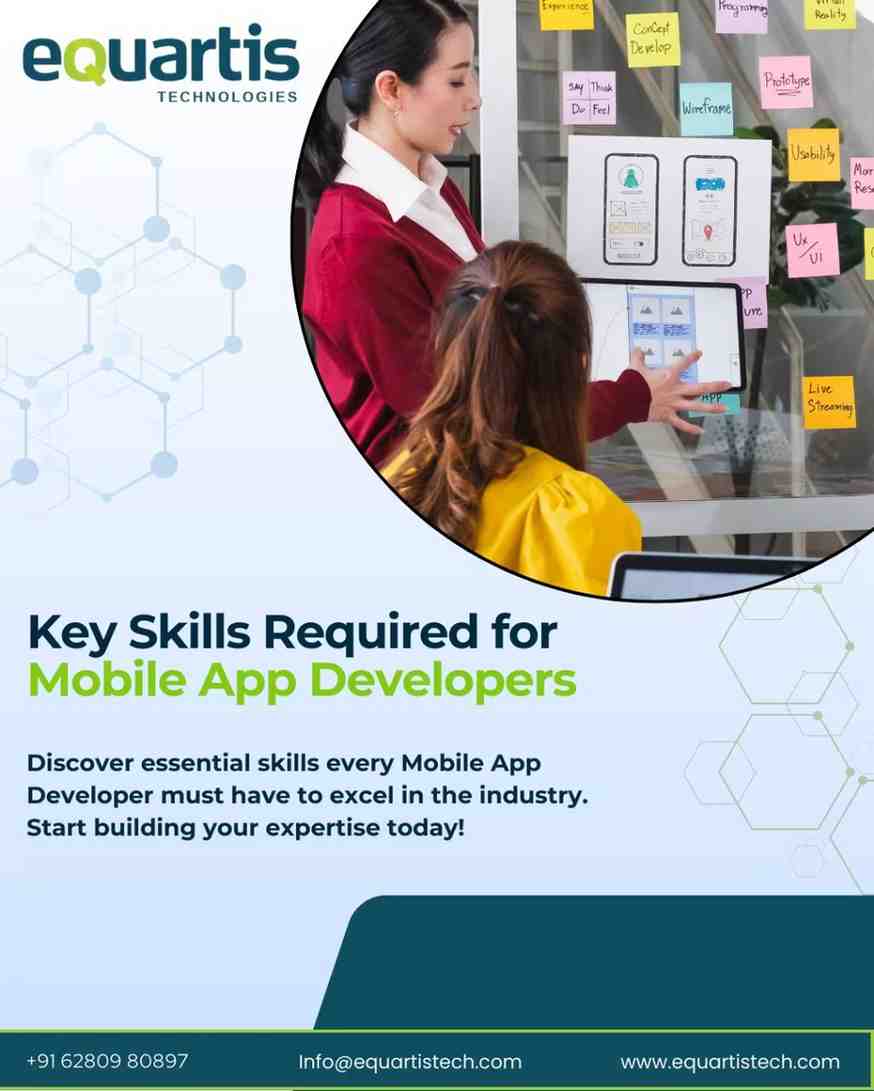
Discover essential skills every Mobile App Developer must have to excel in the industry. Start building your expertise today!
The mobile app industry is booming, with millions of apps available on platforms like Android and iOS. As businesses and individuals increasingly rely on mobile applications for various purposes, the demand for skilled Mobile App Developers continues to grow. However, developing a successful mobile app requires more than just writing code. Developers must possess a combination of technical and soft skills to build user-friendly, high-performing, and secure applications.
In this blog, we will explore the essential skills required for Mobile App Developers to excel in their careers and deliver top-quality mobile applications. Whether you are a beginner or an experienced developer, mastering these skills will help you stay ahead in the competitive field of Mobile Application Development.
1. Proficiency in Programming Languages
One of the most fundamental skills for a Mobile App Developer is expertise in programming languages. Depending on the platform, different languages are used:
For Android Development: Java and Kotlin are the primary languages.
For iOS Development: Swift and Objective-C are essential.
For Cross-Platform Development: Languages like Dart (Flutter), JavaScript (React Native), and C# (Xamarin) are commonly used.
A solid understanding of these languages allows developers to write efficient, maintainable, and scalable code for different mobile applications.
2. Understanding of Mobile UI/UX Design Principles
A well-designed mobile app is crucial for user engagement and retention. Developers should have a good grasp of UI (User Interface) and UX (User Experience) principles, including:
Responsive and Adaptive Design: Ensuring apps work well on different screen sizes and resolutions.
User-Friendly Navigation: Making apps intuitive and easy to use.
Interactive Elements: Designing buttons, forms, and menus that enhance user experience.
Knowledge of design tools like Figma, Adobe XD, and Sketch can be beneficial for collaborating with designers.
3. Cross-Platform App Development Skills
While some developers specialize in either Android or iOS, many businesses prefer cross-platform development to save time and resources. Frameworks like React Native, Flutter, and Xamarin allow developers to build apps that run on both Android and iOS with a single codebase.
Cross-platform development requires:
Familiarity with respective frameworks.
Understanding of platform-specific limitations and best practices.
Experience in debugging cross-platform applications.
4. Backend Development and API Integration
Many mobile applications require backend services for storing data, user authentication, and other functionalities. Developers should be familiar with:
Backend Technologies: Node.js, Firebase, PHP, Python (Django), or Ruby on Rails.
RESTful APIs and GraphQL: For seamless communication between the app and server.
Database Management: Knowledge of databases like MySQL, PostgreSQL, Firebase, or MongoDB.
Having backend development skills allows developers to create full-stack applications that are dynamic and data-driven.
5. Knowledge of Version Control Systems
Version control systems help developers manage code changes efficiently and collaborate with teams. Git is the most widely used version control system, and developers should be familiar with:
Using Git commands like push, pull, merge, and branch.
Platforms like GitHub, GitLab, and Bitbucket.
Handling code conflicts and rollback mechanisms.
Understanding version control ensures a smooth workflow and better project management.
6. Security and Data Protection
Security is a top priority in Mobile Application Development, as mobile apps handle sensitive user data. Developers should implement:
Secure Coding Practices: Avoiding vulnerabilities like SQL injection and cross-site scripting.
Data Encryption: Protecting user data through encryption techniques.
Authentication and Authorization: Using OAuth, JWT, and biometric authentication for secure access.
Ensuring security in mobile apps builds trust among users and protects them from cyber threats.
7. Debugging and Testing Skills
A mobile app should be free of bugs and performance issues before deployment. Developers should be skilled in:
Debugging Tools: Android Studio Debugger, Xcode Debugger, and Chrome DevTools.
Unit Testing and UI Testing: Using frameworks like JUnit, Espresso, XCTest, and Selenium.
Performance Optimization: Ensuring fast load times, memory efficiency, and battery optimization.
Proper testing helps in delivering a smooth and error-free user experience.
Conclusion
Becoming a successful Mobile App Developer requires a combination of technical expertise, creative skills, and problem-solving abilities. From mastering programming languages to ensuring security and deploying applications, developers must stay updated with the latest industry trends and tools.
If you’re looking to develop a high-quality mobile app, partnering with a professional App Development Company in Chandigarh can help turn your ideas into reality. With expert developers, cutting-edge technology, and a commitment to excellence, the right development team can create apps that stand out in the competitive market.
By continuously improving skills, staying adaptable, and embracing new technologies, mobile app developers can thrive in this ever-evolving industry and build impactful applications that users love.
© 2024 Crivva - Business Promotion. All rights reserved.